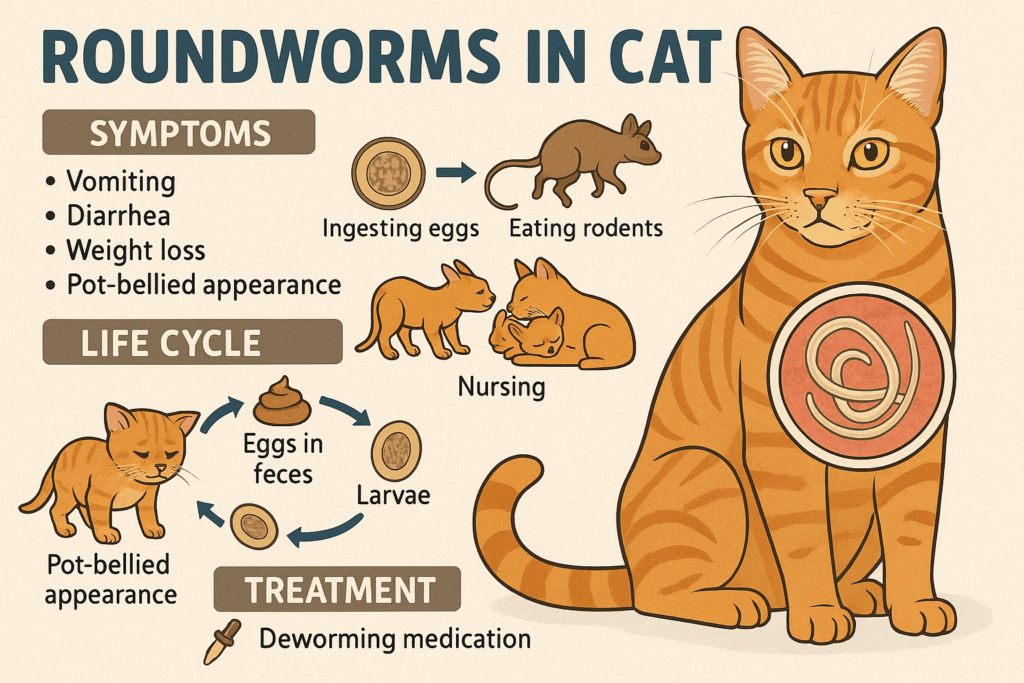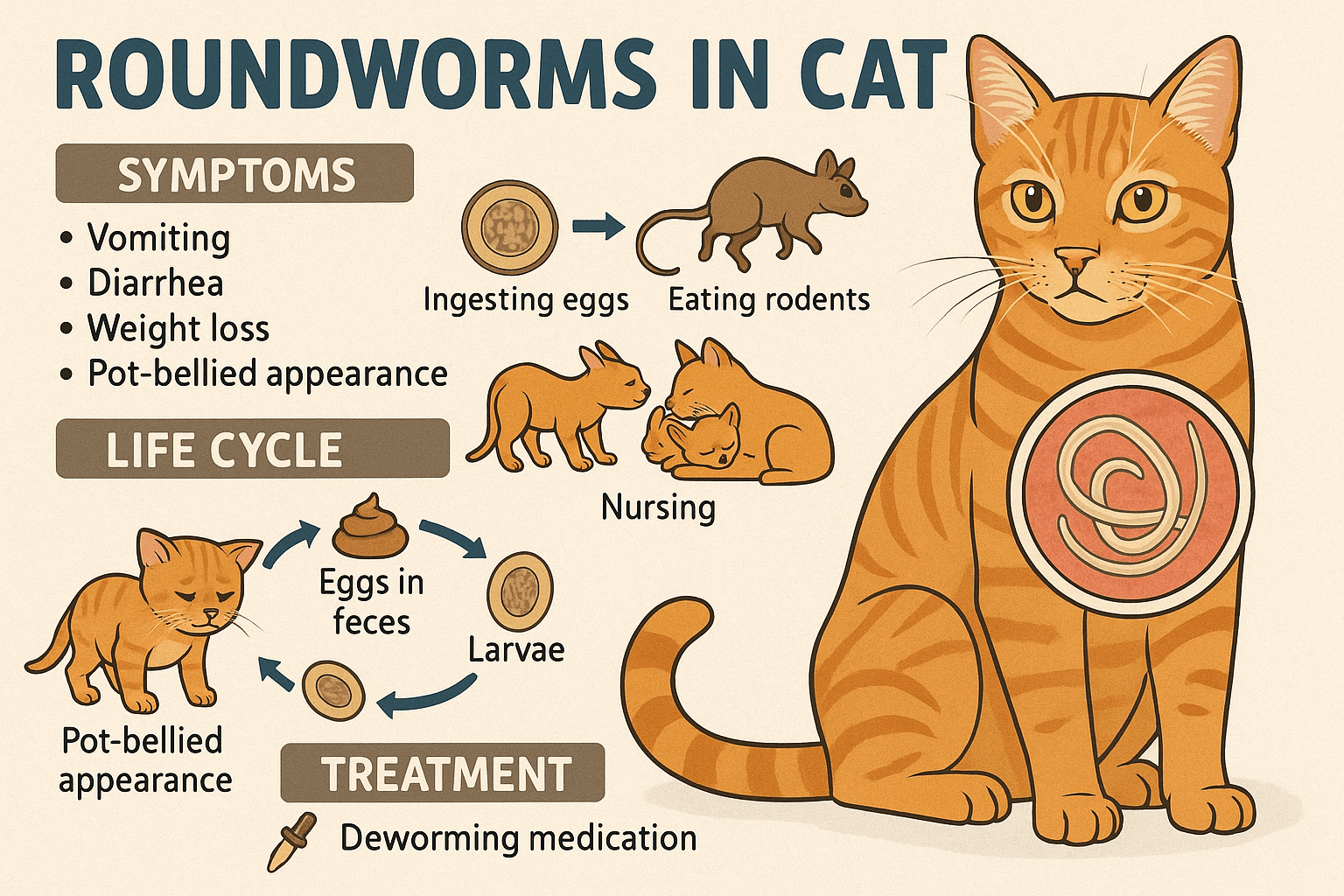Roundworms in Cats: What You Need to Know
Roundworms are one of the most common intestinal parasites found in cats, and while they may not always cause immediate harm, they can lead to serious health issues if left untreated. These spaghetti-like worms thrive in a cat’s digestive system, often causing symptoms like vomiting, diarrhea, or a pot-bellied appearance. Understanding how roundworms affect your feline friend, how they are transmitted, and what you can do to prevent or treat them is crucial for ensuring your cat’s well-being. Whether you’re a seasoned cat owner or new to pet care, this guide will provide you with all the information you need to protect your furry companion from these pesky parasites.
Expert Insight on the Dangers of Roundworms in Cats
“Although it is usually not life-threatening in adult cats, a roundworm infection can kill kittens and older cats. Kittens often have fewer reserves to compensate for loss from the roundworm; older cats may have other diseases that decrease their body’s ability to compensate for loss.”
How Cats Get Infected with Roundworms
Cats can become infected with roundworms through various means, many of which are linked to their environment or behavior. Knowing how transmission occurs can help you take preventive measures to keep your cat safe.
Ingesting Contaminated Soil:
Cats may accidentally swallow roundworm eggs when grooming themselves after coming into contact with contaminated soil or sand.Eating Infected Prey:
Hunting cats that consume rodents, birds, or insects can ingest roundworm larvae present in these animals.Through Mother’s Milk:
Kittens can contract roundworms by nursing from an infected mother cat, making early deworming essential for young kittens.Contact with Infected Feces:
Roundworm eggs can survive in feces for extended periods, posing a risk if cats come into contact with contaminated waste.Indoor Cats Are Not Immune:
Even indoor cats can be exposed to roundworms through shared litter boxes or contaminated items brought indoors.
By understanding these transmission routes, you can take proactive steps to minimize your cat’s exposure to roundworms and keep them healthy.

Signs Your Cat May Have Roundworms
While some cats with roundworms show no obvious symptoms, others may exhibit clear signs of infection. Recognizing these symptoms early can help you seek treatment promptly.
Visible Worms in Vomit or Stool:
Adult roundworms may appear in your cat’s vomit or feces, resembling thin strands of spaghetti.Pot-Bellied Appearance:
A swollen abdomen, especially in kittens, is a common sign of a heavy roundworm infestation.Diarrhea or Vomiting:
Gastrointestinal upset, including loose stools or frequent vomiting, can indicate the presence of roundworms.Weight Loss or Poor Appetite:
Despite eating normally, infected cats may lose weight or show a lack of interest in food due to nutrient depletion.Lethargy or Weakness:
Cats suffering from roundworms may appear unusually tired or less active than usual.
If you notice any of these signs, it’s important to consult your veterinarian for proper diagnosis and treatment.
Check this guide 👉Roundworm Treatment for Cats: Best 7 Expert Tips!
Check this guide 👉Rice Tapeworms in Cats: Best 7 Expert Tips!
Check this guide 👉Can Worms Spread from Cat to Cat? Best 7 Health Tips!
Preventive Measures Against Roundworms | Treatment Options for Infected Cats |
|---|---|
Regular deworming treatments | Prescription deworming medications |
Keeping litter boxes clean | Follow-up vet check-ups |
Avoiding outdoor hunting | Monitoring symptoms post-treatment |
Washing hands after handling soil | Isolating infected cats temporarily |
Feeding cooked or commercial pet food | Administering supportive care as needed |
Steps to Prevent Roundworms in Cats
Preventing roundworms is far easier—and less stressful—than dealing with an active infection. Here are some practical steps you can take to safeguard your cat’s health.
Schedule Regular Vet Check-Ups:
Routine veterinary visits allow for early detection and prevention of roundworms through regular fecal exams.Deworm Kittens Early:
Begin deworming kittens as early as three weeks old, following your vet’s recommended schedule.Maintain Clean Litter Boxes:
Scoop litter boxes daily and disinfect them weekly to reduce the risk of contamination.Limit Outdoor Exposure:
Keep indoor-only cats safe from environmental hazards, including exposure to infected prey or soil.Practice Good Hygiene:
Wash your hands thoroughly after handling your cat, cleaning litter boxes, or gardening to avoid spreading roundworm eggs.
Taking these preventive measures significantly reduces the likelihood of roundworm infections in your cat.
How Roundworms Can Affect Humans
Roundworms aren’t just a threat to cats—they can also pose risks to humans, particularly children. Understanding zoonotic transmission helps protect both your family and your pets.
Accidental Ingestion of Eggs:
Humans can contract roundworms by accidentally swallowing eggs found in contaminated soil or surfaces.Toxocariasis Symptoms:
In humans, roundworm infections can lead to toxocariasis, causing symptoms like fever, coughing, or vision problems.Children Are More Vulnerable:
Kids playing in sandboxes or gardens are at higher risk of ingesting roundworm eggs due to hand-to-mouth behavior.Proper Handwashing Reduces Risk:
Teaching children to wash their hands after playing outdoors minimizes the chance of infection.Regular Deworming Protects Pets and People:
Ensuring your cat is free of roundworms indirectly protects your household from potential exposure.
By staying informed and vigilant, you can mitigate the risks of roundworm transmission to humans.
Types of Roundworms in Cats
There are different species of roundworms that can infect cats, each with unique characteristics. Understanding these types helps tailor treatment and prevention strategies effectively.
Toxocara cati:
The most common roundworm species in cats, often transmitted through mother’s milk or ingestion of eggs.Toxascaris leonina:
Less common but still problematic, this species affects both cats and dogs and spreads via contaminated environments.Life Cycle Differences:
Each species has a distinct life cycle, influencing how quickly symptoms develop and how infections spread.Zoonotic Potential Varies:
Some roundworm species pose greater risks to humans than others, highlighting the importance of identification.Veterinary Diagnosis Matters:
Proper identification ensures targeted treatment, reducing the risk of reinfection or complications.
Knowing the type of roundworm affecting your cat allows for more precise and effective care.
Natural Remedies vs. Medications
While prescription medications are the gold standard for treating roundworms, some pet owners explore natural remedies. Comparing these options helps you make an informed decision.
Pumpkin Seeds:
Often touted as a natural dewormer, pumpkin seeds may help expel parasites, though evidence is anecdotal.Herbal Supplements:
Ingredients like wormwood or garlic claim antiparasitic properties but should be used cautiously under vet guidance.Diatomaceous Earth:
Food-grade diatomaceous earth is believed to kill parasites, but its effectiveness against roundworms isn’t clinically proven.Prescription Medications Are Reliable:
Vet-prescribed dewormers target specific parasites and are backed by scientific research for safety and efficacy.Consult Your Vet First:
Always discuss natural remedies with your veterinarian to avoid harmful interactions or ineffective treatments.
Balancing natural approaches with professional advice ensures your cat receives the best care possible.
Tips for Managing Multi-Cat Households
In homes with multiple cats, managing roundworms requires extra diligence to prevent outbreaks and cross-contamination. These tips can help maintain a parasite-free environment.
Separate Litter Boxes:
Assign individual litter boxes to each cat to reduce the risk of spreading roundworm eggs.Rotate and Disinfect Toys:
Regularly clean and rotate toys to eliminate potential contamination sources.Monitor Shared Spaces:
Pay close attention to areas where cats interact, such as scratching posts or bedding, and sanitize them frequently.Establish a Deworming Schedule:
Treat all cats in the household simultaneously to prevent reinfection cycles.Observe Behavioral Changes:
Watch for signs of illness in any cat, as roundworms can spread quickly in multi-cat settings.
With careful management, you can keep your entire feline family healthy and free of roundworms.
Frequently Asked Questions About Roundworms in Cats
Can indoor cats get roundworms?
Yes, indoor cats can contract roundworms through contaminated items, shared litter boxes, or even insects carrying eggs.
Are roundworms dangerous for kittens?
Yes, heavy infestations can cause severe malnutrition, stunted growth, or even death in young kittens.
How do vets diagnose roundworms?
Veterinarians typically perform a fecal flotation test to detect roundworm eggs in your cat’s stool.
What happens if roundworms go untreated?
Untreated roundworms can lead to intestinal blockages, malnutrition, and other serious health complications.
Can I prevent roundworms naturally?
Untreated roundworms can lead to intestinal blockages, malnutrition, and other serious health complications.
Protecting Your Cat from Roundworms
Roundworms are a common yet manageable health concern for cats, provided you stay informed and proactive. By recognizing the signs of infection, practicing good hygiene, and following preventive measures, you can ensure your cat remains happy and healthy. Remember, routine veterinary care is your best ally in combating roundworms and keeping your feline friend parasite-free. With a little effort and attention, you can create a safe environment where your cat thrives without the burden of these unwelcome invaders.
Can a Cat Be Tested for Rabies? Best 7 Expert Tips! – Learn if testing is possible, understand the process, and discover prevention tips to keep your cat safe from rabies.
Can a Dog Be Tested for Rabies? Best 7 Expert Tips! – Learn how rabies testing works, why it’s critical, and what every dog owner needs to know.
Best Vegetables for Cat Food: Best 7 Expert Tips! – Discover safe, nutritious veggies to boost your cat’s diet, support digestion, and enhance overall health naturally.
Best Vegetables for Dog Food: Best 7 Expert Tips! – Discover safe, nutritious veggies to boost your dog’s diet, support digestion, and enhance overall health naturally.





